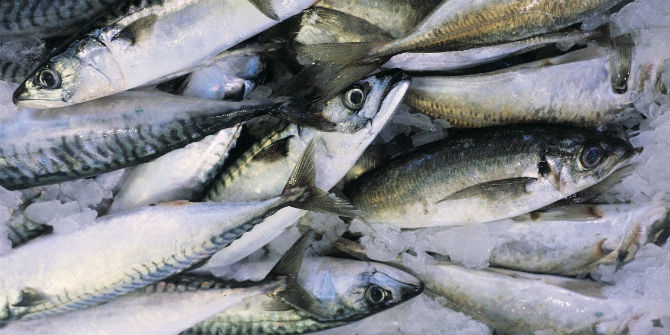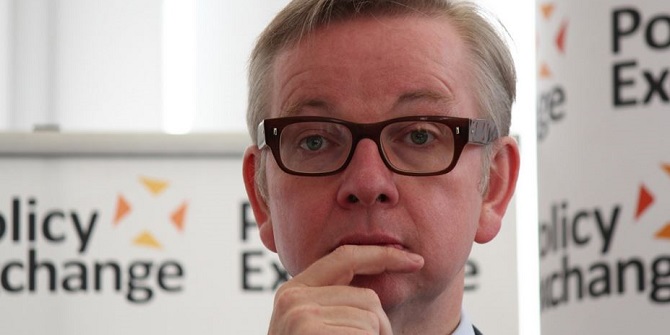Britain’s fishing fleets expected great things of Brexit. Aaron Hatcher (University of Portsmouth) explains why they will probably end up disappointed.
Although it contributes only around a billion pounds or so to UK GDP, fishing has a received a surprising amount of attention in the run up to Brexit. But the UK fishing industry has often appeared to punch above its weight politically. Perhaps because we are an island nation, and proud of our seafaring heritage, we do seem to care a lot about fishing (even if we don’t actually want to eat much of the fish caught).

The fishing industry has been promised a lot from Brexit: exclusive control over UK waters, with tightly restricted access for EU boats; bigger shares of the catch quotas for a number of fish stocks, more in line with their actual abundance around the UK; and an end to burdensome and inflexible regulation under the Common Fisheries Policy (CFP). The Fisheries Bill currently making its way through Parliament envisages a fresh start for UK fishing, a release from the hated CFP and an opportunity for the UK to devise its own sensible, conservation-oriented, fishery management regime delivering profitable and sustainable fisheries into the future. Is all of this achievable? Well, yes, up to a point. Will it happen? No, probably not …
The UK certainly will, at the end of the transition period, leave the CFP and become an independent coastal state. It will have control of its own 200-mile Exclusive Economic Zone (EEZ), with rights and responsibilities internationally recognised under the UN’s Convention on the Law of the Sea (UNCLOS). The UK can indeed then decide who has access to its waters. Of course, the UK’s geographical position means that its EEZ extends to a lot less than 200 nautical miles in most places, in particular in the southern North Sea and Channel and in the Irish Sea, where the UK EEZ meets the EEZs of other countries.
Nevertheless, the UK EEZ does represent a significant part of the area in which other EU member states are accustomed to fish. It is also worth recalling that the UK has never actually had exclusive control over its own 200-mile EEZ. When the UK joined the EEC in 1973 its fishery limits only extended out to 12 miles, and some other European countries already had historical fishing rights in the 6-12 mile zone (rights that were written into the UK’s accession treaty, and subsequently into the CFP). Beyond 12 miles were international waters, open to all. It was only in the late 1970s that the EEC Member States, acting in concert, extended their EEZs out to 200 miles, forming a de facto European fishing “pond” to which equal access had already been enshrined in the very first of the CFP regulations.
As a result of this, other EU Member States have strong historical claims to fishing rights within the UK EEZ. The UK is not obliged to grant access to its EEZ, although under UNCLOS it would be expected that it would. The UK is also not obliged to grant access to all the EU boats which currently fish in UK waters, but the UK EEZ forms such a large part of Europe’s seas that catches from the UK zone are of very considerable economic importance to a number of EU Member States. Denmark, for example, would find it impossible to catch its quotas of herring and mackerel if it could no longer fish in UK waters, with devastating consequences for its industry. This is why the EU is determined that the current level of access be maintained, and it has stated this quite clearly.
Will the UK have to give in to these demands for access? To a great extent, probably. UK vessels do fish in the EEZs of other EU Member States, but not to quite the same degree. What really matters to UK fishermen is access to markets. UK consumers eat relatively little fish compared to consumers elsewhere in Europe, and what they do eat is largely supplied by non-EU imports (think canned tuna, tropical prawns, Norwegian/Icelandic cod and frozen blocks of Alaskan pollack). Most of the UK’s high value catch is exported, the great majority to the EU. Tariff-free trade in fish with the EU is therefore vital for the UK fishing industry. While the industry has continually sought (and been given) reassurances from the government that access to markets and access to resources will not be linked, in practice they almost certainly will be. Indeed fishing access is so important to the EU that it will probably be linked (though not explicitly) to a deal in other sectors as well (financial services has already been mentioned by some EU leaders).
Access to waters forms only part of the current system of allocating fishing rights under the CFP, however. These days, fishing for most fish species is subject to quotas. The total quotas (Total Allowable Catches or TACs) are determined annually by the EU Council of Ministers based on scientific advice from ICES, the International Council for the Exploration of the Sea. The subsequent dividing up of TACs into national quotas is, as might be expected, a contentious issue. Because of this, the percentage shares have changed very little since 1982, when they were originally agreed after years of negotiation. Patterns of fishing, and the distribution of fish, have changed a lot since then, but the basic allocation key has not. Intended at the time to provide “relative stability” for national fishing fleets, these quota shares have become increasingly mismatched to what fishermen actually catch. Most countries end up with higher allocations than they need for some species, but relative shortages for others. This is particularly problematic for the high-value “mixed fisheries” where many different species are caught together in the same nets. Boats without quota for part of their catch were, until recently, obliged to discard such fish at sea. This is what led to the current ban on discarding, but relative quota shortages just make the ban virtually impossible to enforce.
The UK can argue, with considerable justification, for changes in many of its existing quota shares, but the idea of a wholesale recalibration of the original allocation key is unlikely to be welcomed by the remainder of the EU. As a third country, from next year the UK will have to reach agreement with the EU on the annual TACs for all those fish stocks of mutual interest (as Norway does now, although for a very much smaller number of stocks), but the Government’s stated aim of significantly larger quota shares based on “zonal attachment” (the relative preponderance of fish within each country’s EEZ) appears ambitious, to say the least. Ironically, by leaving the EU the UK might lose access to the flexibility that is built into the system – the facility for international quota swaps – which UK fishery managers currently use extensively in support of the industry.
The UK fishing industry may face disappointment all round. The UK will try to make any access arrangements conditional on a complete readjustment of quota shares, but the EU will threaten the alternative of hefty tariffs on fish, and possibly a poor deal for other, economically more important, sectors as well, a price that the UK government is unlikely to be willing to pay. The UK can still try to negotiate bigger quota shares, but it will find the EU as a bloc relatively inflexible. And when there is disagreement over quota shares, there exists the very real danger of simply driving TACs up to unsustainable levels (as happened with Iceland over mackerel). At the end of the transition period, the UK might well end up with access arrangements and quota shares looking not markedly different to those it has now. As for those burdensome regulations – from catch logs to the size of nets – many, if not most, will simply be replaced by very similar UK rules; and as for the discard ban, which is hugely unpopular with the industry, the UK will probably keep it in some form or other (or face a noisy backlash from conservationists).
The jubilation of the UK fishing industry over Brexit could easily give way to cries of betrayal. But many in the industry will not be completely surprised: they felt similarly betrayed by government when we joined the European Community in 1973.
This post represents the views of the author and not those of the Brexit blog, nor LSE.






Totally EU biased.
Fishing is currently small because the cod wars lost us eg 34000 jobs in hull alone.
Secondly the EU has no right to our 200 mile zone. If we hadn’t joined it was ours alone and so should return to us.
@Dr m buckton, best to read the article.